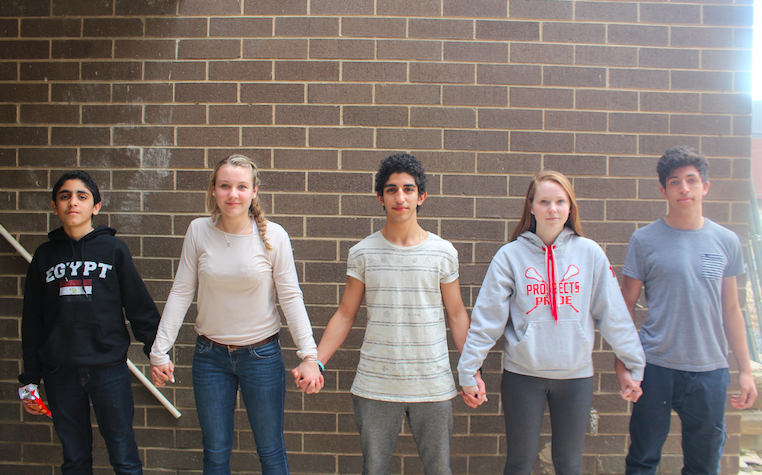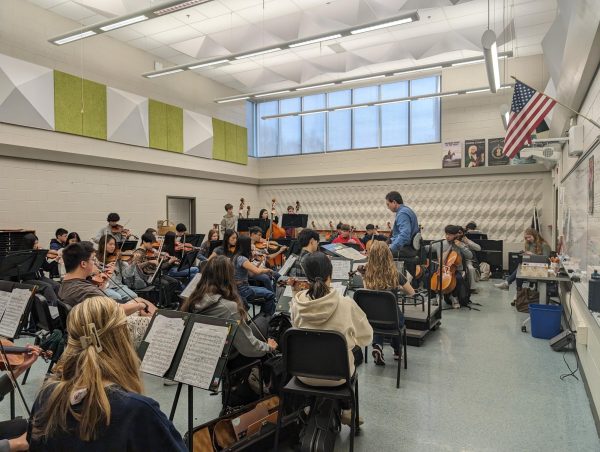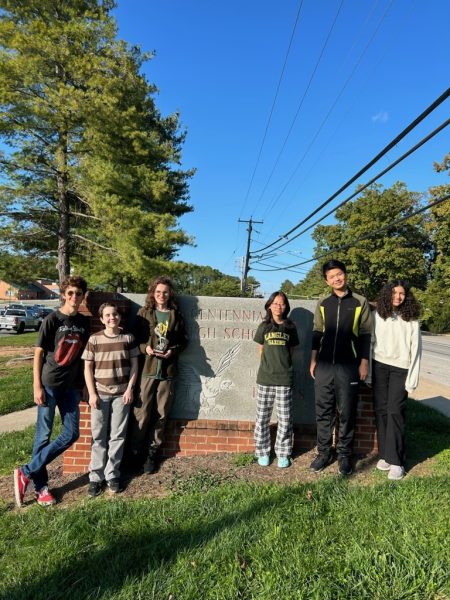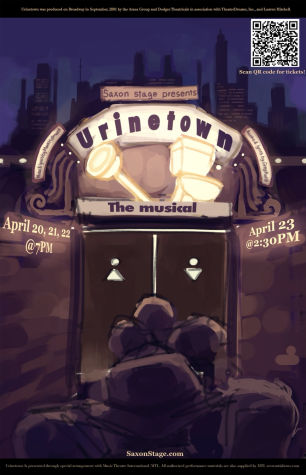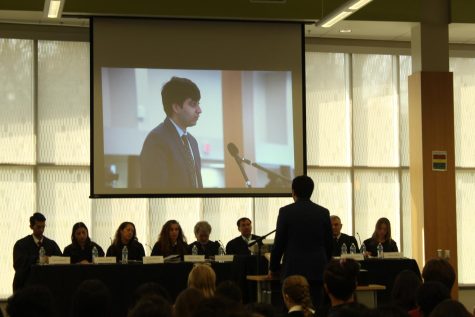Trump’s Executive Order Draws Concern Among Students
Students hold hands in solidarity in an effort to show that Langley is an inclusive community that is accepting of all people.
President Donald Trump’s travel ban on seven Muslim-majority nations marked an early defining moment for his presidency — fundamentally changing America’s position toward immigrants from Iraq, Iran, Libya, Sudan, Syria, Somalia, and Yemen entering the United States — as the world and Langley’s diverse student body listens closely.
It also represents a pronounced shift in U.S. counterterrorism efforts in the post 9/11 era, fueling the ongoing debate about national security policy and how to best keep Americans safe while battling extremism without alienating Muslims in a way that could lead to more radicalism by ISIS fundamentalists and mounting divisiveness from home-grown terrorism.
The executive order, which also temporarily bars refugees from entering the United States, represents the first clash between Trump’s self-proclaimed ‘politically incorrect’ style of leadership and what his critics see as values that are detrimental to this welcoming melting pot nation of immigrants.
The order’s indefinite ban on Syrian refugees entering the United States — on the premise that it is hard to vet people from shattered nations with possible links to terrorism — implies the United States is turning its back on the victims of the world’s worst current humanitarian crisis. Past presidents have generally avoided such a stance on restrictive immigration.
“I can’t really wrap my head around the Muslim ban,” said Kareem Al-Attar, a Senior at Langley.
“The ban seems as a way to point fingers; when there’s some sort of fear, it’s easy to point at something or someone and say ‘there, that’s the problem, those people over there’,” he added.
Trump rejected the criticism for his immigration measures, blaming long lines at the airport for detained travelers on Delta computer outages. He tweeted: “There is nothing nice about searching for terrorists before they can enter our country. This was a big part of my campaign. Study the world!”
Despite the controversy, the White House has made clear that Trump is deeply committed to the new policy and will continue its effort to restrict immigration to protect our nation’s borders while mounting protests and legal efforts by the CEO’s of Google and Microsoft temporarily halt the President’s travel ban through the Ninth Circuit Court of Appeals decision.
“A lot are saying it’s just a security method and a way to protect our borders…however, countries like Saudi Arabia, which is a hub for terrorist activities and violence, aren’t on the list,” said Al-Attar. “There really isn’t any transparency, and the reasoning for these actions don’t make sense.”
Other Langley students, however, argued that the president has stuck to his campaign promises in which he made his views on immigration very clear.
According to Junior Cooper Davis, “I think that we need to acknowledge a problem if we wish to solve it, and Obama for example did not even call out ISIS by its name or what it really was, and the first step to actually solve a problem is to acknowledge that it’s a problem.”
Freshman Muhammad Al-Atrash, a devout Muslim, supports a travel ban because it promotes American safety. “I think it’s a great starting idea that needs to be expanded. 90 days is too little…it needs to be expanded to at least a year until terrorism ceases down,” Al-Atrash said.
Al-Atrash’s main concern with the ban is that it doesn’t restrict immigration from the other 43 Muslim-majority countries. “I don’t think any of the opposing viewpoints are legit because it’s not a Muslim ban and it’s not unconstitutional. That kind of rhetoric is really harmful, especially to our soldiers abroad…because they need translators, interpreters abroad who help them… a lot of leftists and the mainstream media are portraying this in the wrong way. Constructive criticism is okay but saying rhetoric that it’s a Muslim ban is really harmful,” according to Al-Atrash.
In many ways, President Trump is doing exactly what he campaigned on and considered one of the main reasons he was elected by a conservative majority quite similar to the Brexit vote in England.
“I think the way in which he rolled it out may have been sensitive to many people because it was kind of pronounced as a Muslim ban, but I think it’s more of a way to protect our country, and whatever measures we can take to make sure that our country is 100% safe is good,” Davis iterated.
However, Junior Sumayyah McTaggart offers a differing viewpoint.
“I think it’s really discriminatory and ridiculous that countries where Trump seems to have business interests are not included in the ban,” she said. “It really just seems that Trump’s motives are not to protect the country but rather to protect his own interests.”
McTaggart suggests, “I think it might be interesting to look at another vetting program — most definitely the system needs to be reformed in order to prevent those types of [terrorist] acts, but I don’t think they’re going about it right. Blanket banning doesn’t really work and it actually furthers ISIS’s narrative that it’s them against the West, so I think it’s a dangerous thing to do.”
Both McTaggart and Al-Attar are concerned about the travel ban’s effect on their families as are many others in the Langley community with relatives from the seven restricted countries who work or study here as permanent residents and contribute to the U.S. economy. The restrictive travel ban also prevents permanent residents from the seven Muslim majority countries from re-entering the United States if they travel abroad.
“I have friends whose parents are green card holders that are somewhat worried about the effects [of immigration restrictions] on their parents,” said McTaggart.
“My grandparents want to come visit our family in May, but might be subject to the ban, even though they are UK residents, originally from Iraq,” said Al-Attar. “Hopefully these restrictions will be overturned, and the Trump administration understands that simply pointing fingers and blaming innocent people for domestic and international security issues is not the right course of action.”
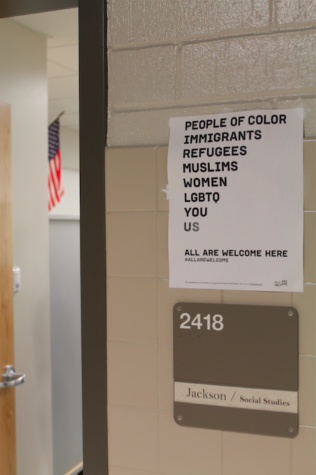
History teacher Mr. Ryan Jackson posted this message of acceptance by his classroom door after the travel ban was announced, starting a trend that several other teachers soon followed.
Teachers like Mr. Ryan Jackson have kept an open door policy towards Langley students concerned by the travel ban. Mr. Jackson sent an email to his fellow Langley teachers informing them of his decision to post a sign which reads: “People of color, Immigrants, Refugees, Muslims, Women, LGBTQ, You, US. All are welcome here.” The message of acceptance lets concerned students know that his classroom is a safe and welcoming place for everyone, regardless of any labels.
“Although the paternal Jackson side of my family tree has been in the United States since the 18th century, my other three grandparents were either first- or second-generation immigrants arriving through Ellis Island to start a new life in this amazing land of opportunity for all people,” said Mr. Jackson. “I am the grandchild of immigrants, and I am proud of this fact.”
“While America isn’t perfect – as no country is – I believe it is already pretty great, and that includes the presence and contributions of immigrants, both throughout its history and in our present time.”
Mr. Jackson’s sentiments about an inclusive, safe, and accepting Langley community are best expressed in this email to teachers:
Good Morning,
We are all aware of the executive orders, protests, tweets, posts, and overall heightened tensions in our nation (and as a result, the surrounding world) that seem to be increasing our divisions and inhibiting our ability to come together for a common good. While this may be the state of our country at the moment, I do not believe it is the state of our school.
I do believe that regardless of political affiliation (or any other personal characteristics), ALL of us work at Langley because we value and support ALL of our students regardless of their individual aspects: race, ethnicity, nationality, religion, gender, orientation, etc.
I placed the attached outside my classroom this morning to display a reminder to ALL students that my door is open to ALL of them no matter what. I encourage you to do the same, but completely respect your personal choice if you do not wish to follow suit.
We are stronger together, we are better together, we are Saxons together.

